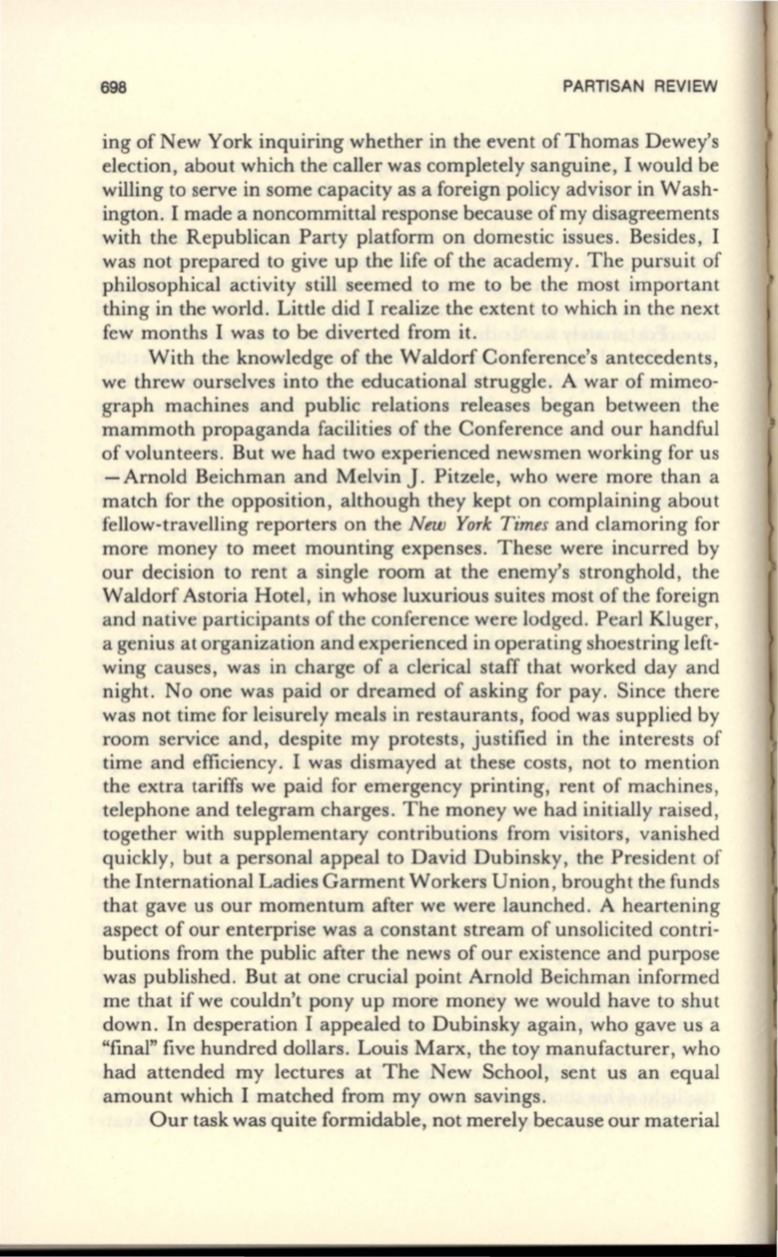
698
PARTISAN REVIEW
ing of New York inquiring whether in the event of Thomas Dewey's
election , about which the caller was completely sanguine , I would be
willing to serve in some capacity as a foreign policy advisor in Wash–
ington. I made a noncommittal response because of my disagreements
with the Republican Party platform on domestic issues. Besides, I
was not prepared to give up the life of the academy. The pursuit of
philosophical activity still seemed to me to be the most important
thing in the world. Little did I realize the extent to which in the next
few months I was to be diverted from it.
With the knowledge of the Waldorf Conference's antecedents,
we threw ourselves into the educational struggle. A war of mimeo–
graph machines and public relations releases began between the
mammoth propaganda facilities of the Conference and our handful
of volunteers . But we had two experienced newsmen working for us
-Arnold Beichman and Melvin
J.
Pitzele, who were more than a
match for the opposition, although they kept on complaining about
fellow-travelling reporters on the
New York Times
and clamoring for
more money to meet mounting expenses. These were incurred by
our decision to rent a single room at the enemy's stronghold, the
Waldorf Astoria Hotel, in whose luxurious suites most of the foreign
and native participants of the conference were lodged. Pearl Kluger ,
a genius at organization and experienced in operating shoestring left–
wing causes, was in charge of a clerical staff that worked day and
night. No one was paid or dreamed of asking for pay. Since there
was not time for leisurely meals in restaurants, food was supplied by
room service and, despite my protests, justified in the interests of
time and efficiency . I was dismayed at these costs, not to mention
the extra tariffs we paid for emergency printing, rent of machines ,
telephone and telegram charges. The money we had initially raised,
together with supplementary contributions from visitors, vanished
quickly, but a personal appeal to David Dubinsky, the President of
the International Ladies Garment Workers Union , brought the funds
that gave us our momentum after we were launched. A heartening
aspect of our enterprise was a constant stream of unsolicited contri–
butions from the public after the news of our existence and purpose
was published. But at one crucial point Arnold Beichman informed
me that if we couldn't pony up more money we would have to shut
down. In desperation I appealed to Dubinsky again, who gave us a
"final" five hundred dollars. Louis Marx, the toy manufacturer, who
had attended my lectures at The New School, sent us an equal
amount which I matched from my own savings.
Our task was quite formidable, not merely because our material


